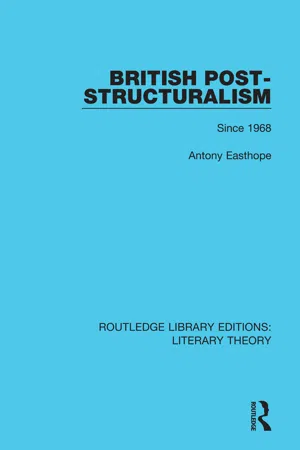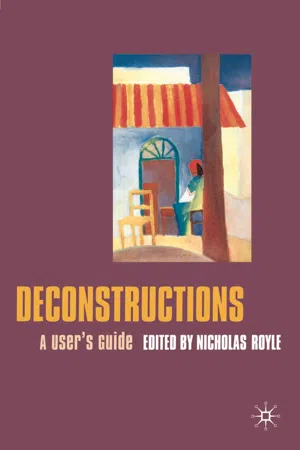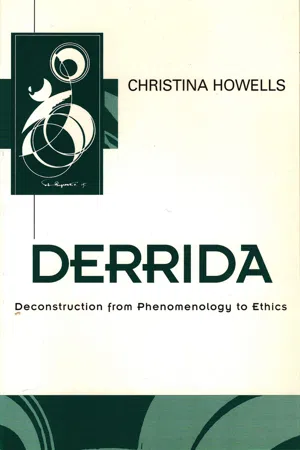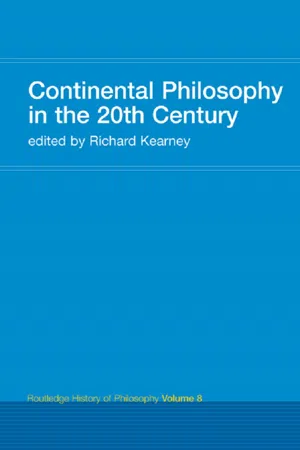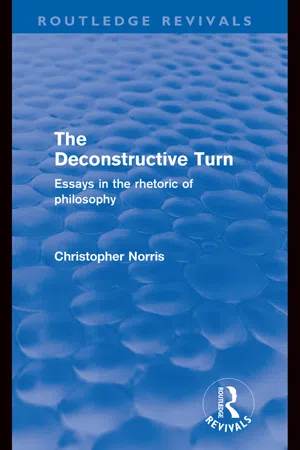Deconstruction
Deconstruction is a literary theory that seeks to uncover the underlying assumptions and contradictions within a text. It challenges traditional notions of meaning and binary oppositions, emphasizing the ambiguity and complexity of language. Deconstruction aims to reveal the inherent instability and multiple interpretations of a text, highlighting the fluidity of language and the impossibility of arriving at a fixed, singular meaning.
8 Key excerpts on "Deconstruction"
- eBook - ePub
British Post-Structuralism
Since 1968
- Antony Easthope(Author)
- 2019(Publication Date)
- Routledge(Publisher)
...161) the term ‘Deconstruction’ has come to carry several different meanings. In this and the previous chapter on “Literary theory” it has been used in five ways: (1) A criticism designed to challenge the realist mode in which a text aims to naturalise itself by demonstrating its actual constructedness, to exhibit the means of representation by which the represented is brought about (“The object of deconstructing the text is to examine the process of its production”, Belsey 1980, p. 104; “in deconstructing the tenets of perceptualism what analysis begins to see…is a shadowy activity behind the image, manipulation of the sign as plastic substance”, Bryson 1983, p. 130). (2) Deconstruction in a Foucauldian context, a procedure for revealing the inter-discursive dependencies of a discourse (see Chapter 7). (3) Deconstruction in the sense of ‘left Deconstruction’: the project of annihilating the category of ‘Literature’ by uncovering the discursive and institutional practices which uphold it. (4) American Deconstruction: the set of procedures and critical practices deriving mainly from the Paul de Man’s reading of Derrida which aims to discover how a text always differs from itself in a critical reading whose own text, through self-reflexive irony, aims towards a similar undecidability and aporia. (5) Derridean Deconstruction: a critical analysis of inherited binary oppositions in which a left-hand term claims privilege through its denigration of the right-hand term on which it depends, the analysis aiming not to reverse the values of the opposition but rather to breach or undo them by relativising their relation. British post-structuralism, for reasons discussed in relation to the Oxford Literary Review and its Southampton conference of 1981, has remained largely uninterested in Deconstruction in definition (4), American Deconstruction...
- eBook - ePub
Theory in Social and Cultural Anthropology
An Encyclopedia
- R. Jon McGee, Richard L. Warms(Authors)
- 2013(Publication Date)
- SAGE Publications, Inc(Publisher)
...Dustin Bradley Garlitz Dustin Bradley Garlitz Deconstruction Deconstruction 171 175 Deconstruction Deconstruction is a term that represents a particular approach to analysis in contemporary theory in the humanities and social sciences. Developed in the writing of the philosopher Jacques Derrida in the mid-1960s, Deconstruction is among the most influential cultural movements of the past half-century. Tracing its roots back in literature to Laurence Sterne, James Joyce, and, more recently, Thomas Pynchon and its philosophical roots to Georg W. F. Hegel, Friedrich Nietzsche, and Martin Heidegger, the Deconstruction movement began in France in the 1960s amid deep social questioning of traditional institutions, and it enjoyed its greatest popularity in the 1970s and 1980s. The term became associated with (and sometimes was used interchangeably with) poststructuralism, a development that Derrida never accepted. Theory of Deconstruction In general, Deconstruction involves the process of unraveling meaning in texts. Deconstructionists argue that the meaning of language employed in texts is constantly changing and the meaning that readers derive from a text is outside the control of the author. Thus, the process of Deconstruction entails a double movement, the rigorous engagement with a text involving the simultaneous engagement with and undoing of its meaning. Derrida developed the notion of différance to accommodate the numerous features that govern the production of such textual meaning. Différance, a term Derrida created, is a homophone with the word différence, and it implies both “to defer” and “to differ.” His intent with this wordplay was to show that words never fully represent what they mean. Consequently, according to Derrida, meaning is forever deferred. Derrida had a mistrust of the metaphysical language commonly associated with phenomenology but decided to work within the language itself to dismantle its entire conceptual structure...
- Alan D. Schrift(Author)
- 2014(Publication Date)
- Routledge(Publisher)
...In Hartman’s words, all deconstructors are interested in “figurative language, its excesses over an assigned meaning.” 13 For his part, de Man writes, “A Deconstruction always has for its target to reveal the existence of hidden articulations and fragmentations within assumedly monadic totalities.” 14 As Hillis Miller expands in his contribution to Deconstruction and Criticism, “‘Deconstruction’ is neither nihilism nor metaphysics but simply interpretation as such”; 15 or, “‘Deconstruction,’” he writes even more straightforwardly, “is analytic criticism as such.” 16 In short, for the Yale School of Deconstruction, the closer one reads a text, the more the meaning escapes or becomes elusive, and the more the nature of reading is revealed not as the attainment of a single meaning or correct reading, but univocal meaning’s ultimate failure. For many critics of Deconstruction, this commitment to close readings of canonical texts was the Yale School’s not-so-secret continuation of a traditionalist New Critical methodology. For his part, de Man seemingly concurs: I don’t have a bad conscience when I’m being told that, to the extent that it is didactic, my work is academic or even, as it is used as a supreme insult, it is just more New Criticism. I can live with that very easily, because I think that only what is, in a sense, classically didactic, can be really and effectively subversive. 17 Thus understood (as close reading intensified to a fever pitch of undecidability rather than assured meaning), Deconstruction became the dominant movement in literary criticism of the late 1970s and early 1980s. As de Man wrote in the aftermath of his deconstructive reading of Proustian metaphor and metonymy in his 1973 “Semiology and Rhetoric,” Deconstruction was poised to become the literary critical Zeitgeist: The whole of literature would respond in similar fashion, although the techniques and patterns would have to vary considerably, of course, from author to author...
- eBook - ePub
Deconstructions
A User's Guide
- Nicholas Royle(Author)
- 2017(Publication Date)
- Bloomsbury Academic(Publisher)
...1. The reverse of construction; taking to pieces. rare, L19. 2. A strategy of critical analysis of (esp. philosophical and literary) language and texts which emphasizes features exposing unquestioned assumptions and inconsistencies. L20. Impossibly, I want to do justice to these different definitions. (There, in passing, is another definition, perhaps: Deconstruction is the attempt to come to terms with the fact that justice necessarily ‘exceeds law and calculation’, that it cannot be programmed but comes from the future, and that ‘one must always say perhaps for justice’: see Derrida, 1990a, p. 971.) If I say that the Chambers definition is less accurate, less responsible than the longer or shorter OED ’s, this does not mean I find the OED definitions unproblematic. I want to spell out what is just plain wrong about your definition; but I also want to suggest that none of these definitions is finally perhaps very useful. As I was saying, on the subject of your definition of Deconstruction as ‘a method … applied esp to literary texts’: one of the most lucid and concise texts that Derrida has written on the subject of ‘what is Deconstruction?’ is ‘Letter to a Japanese Friend’. (A letter, like the one you are reading at the moment: I believe there is some significance in this fact of letter writing, I mean to do with the nature of Deconstruction. Letter writing is strangely lonely, alone but not alone. It is singular – just me writing, for example, to just you – but also general, in the sense that a letter must in principle be readable in our absence, even after our deaths. Finally, letter writing will have been an experience – the experience and experiment of a writing in which I do not readily know what I am going to say. In another epistolary text, called ‘Telepathy’, Derrida appropriately recalls Flaubert observing, in a letter to Louise, ‘Only just up, I am writing to you without knowing what I am going to say’ (Derrida, 1988b, p. 12)...
- eBook - ePub
- Jacques Derrida, Derek Attridge, Derek Attridge(Authors)
- 2017(Publication Date)
- Routledge(Publisher)
...He says in Positions, “If we had the time, we could … ask ourselves too, why the irreducibility of writing and, let us say, the subversion of logocentrism are announced better than elsewhere, today, in a certain sector and certain determined form of ‘literary’ practice” (II). To insist upon this importance of literature is not, however, to accord it a position of superiority over other modes of writing (we might note in the comment quoted above that, as so often, Derrida puts “literary” in inverted commas, and stresses that he is talking about a strategic value, at a particular historical moment, rather than a transcendent quality); 32 it is to stress the specific role literature plays in Derrida’s work—or rather roles, since it is a different one each time, and it is the impossibility of predicting what kind of summons the next literary text will make that is part of literature’s importance and power. If we can use the term Deconstruction of the essays collected here— Derrida has acknowledged that the word has acquired a generality and a celebrity which he did not foresee—it is necessary to revise radically the popular images associated with it. Derrida’s practice is neither the bloodless dissection of a scalpel-wielding technician nor the frolicsome play of an exuberant comedian; it is not trapped within the borders of the text (those borders being precisely what it questions), 33 nor does it range with reckless abandon across all borders (their force being one of the things it is most interested in). Deconstruction is not an evil product of the latest stage of multinational capitalism, nor is it a predictable reappearance in new clothes of an ancient philosophical—or literary—game. However, these widespread responses do not come from nowhere; and perhaps the most significant fact about them is the deep contradictions they evince (often within the same hostile response). Deconstruction is indeed contradictory...
- eBook - ePub
Derrida
Deconstruction from Phenomenology to Ethics
- Christina Howells(Author)
- 2013(Publication Date)
- Polity(Publisher)
...4 Deconstructing the Text: Literature and Philosophy Just as Derrida considers traditional conceptions of the relationship between speech and writing to be false and misleading, so he considers the classical opposition between literature and philosophy to be based on an erroneous view of the nature of both. The opposition is predicated on the belief that literature is concerned with aesthetic representation, style and fiction, whereas philosophy is the domain of truth, objectively presented. This familiar binary opposition is one of the most significant targets of Derrida’s deconstructive analysis, in the first place because philosophy deludes itself and its adherents if it claims to present Truth, independent of the language used to express it. This has already been discussed in previous chapters with respect to fields such as geometry and phenomenology. And secondly because literature is not primarily fictional representation, clothed in a pleasing style: the last chapter demonstrated how much more complex Derrida’s conception of language is than this classical model. Derrida considers both literature and philosophy as ‘texts’, and the implications of this will become progressively clearer. It means that philosophical texts are subject to the same kind of analysis as literary ones; to some eyes this may look suspiciously like treating the philosophical text as if it were literature, but this suspicion is based on the assumption that philosophy is ‘above’ questions of its language, operating in an ideal domain of pure truth which Derrida is precisely questioning. We saw Habermas accuse Derrida of approaching philosophical texts via a critique of style, and Derrida’s curt retort: ‘Cela est faux’ (Limited Inc., 245). It is false because the very term ‘style’ is part of the style/content opposition which Derrida contests...
- eBook - ePub
Continental Philosophy in the 20th Century
Routledge History of Philosophy Volume 8
- Richard Kearney, Richard Kearney(Authors)
- 2015(Publication Date)
- Routledge(Publisher)
...To say that the goal of Derridian Deconstruction is not simply the unthought of the tradition, but rather ‘that–which–cannot–be–thought’ is to engage neither in sophistical rhetoric nor negative theology. It is rather to point towards that which philosophy is unable to say. Derridian Deconstruction attempts to situate, ‘a non–site, or a non–philosophical site, from which to question philosophy’. 10 It seeks a place of exteriority, alterity or marginality irreducible to philosophy. Deconstruction is the writing of a margin that cannot be represented by philosophy. In question is an other to philosophy that has never been and cannot become philosophy’s other, but an other within which philosophy becomes inscribed. However (and this is crucial), the paradox that haunts Derrida’s and all deconstructive discourse is that the only language that is available to Deconstruction is that of philosophy or logocentrism. Thus to take up a position exterior to logocentrism, if such a thing were possible, would be to risk starving oneself of the very linguistic resources with which one must deconstruct logocentrism. The deconstructive reader is like a tightrope walker who risks ‘ceaselessly falling back inside that which he deconstructs’ ([13.4], 25; [13.29], 14). Deconstruction is a double reading that operates within a double bind of both belonging to a tradition, a language and a philosophical discourse, and at the same time being unable to belong to the latter. This ambiguous situation of belonging and not–belonging describes the problem of closure. Broadly stated, 11 the problem of closure describes the duplicitous historical moment – now – when language, conceptuality, institutions and philosophy itself show themselves to belong to a logocentric tradition which is theoretically exhausted whilst at the same time searching for the breakthrough from that tradition...
- eBook - ePub
The Deconstructive Turn (Routledge Revivals)
Essays in the Rhetoric of Philosophy
- Christopher Norris(Author)
- 2010(Publication Date)
- Routledge(Publisher)
...Derrida likewise takes over the emphasis which Nietzsche placed upon figurative language as both a source of delusion and a means—the only one available—of dismantling and exposing the ruses of philosophy. In a sentence much quoted by the current deconstructors, Nietzsche described truth as ‘a mobile marching army of metaphors, metonymies and anthropomorphisms…truths are illusions of which one has forgotten that they are illusions …’. 3 Derrida applies this deconstructive insight with the added force and leverage provided by a post-Saussurean critique of the sign and its metaphysical lineage. This is not the place for an adequate discussion of Derrida’s textual strategies, as brought to bear on philosophers from Plato to Heidegger, as well as on those literary texts which he calls to witness for their power of rhetorically subverting the sovereign claim of philosophy. I have made that attempt elsewhere, 4 albeit in the knowledge of Derrida’s repeated warning that Deconstruction is a vigilant activity of thought, and not a system capable of summary description. My purpose here is to offer some comparisons, or suggestive points of contact, between Derrida’s thinking and certain varieties of Anglo-American linguistic philosophy. It might appear that any such attempt must always come up against a barrier of mutual incomprehension. A gulf has seemed fixed between the two traditions, confirmed at every point by deep-grained differences in what was thought to constitute ‘serious’ philosophy. Attitudes to language are at the heart of this problem, increasingly so since structuralism asserted its hold over French critical thought, and British philosophy took the ‘linguistic turn’ which defined its modern character...
